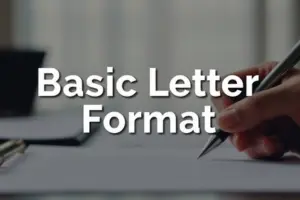How to Write a Resignation Letter: Tips for a Professional Exit
Published: 10 Dec 2024
Did you know that writing a resignation letter is not just a formality but a crucial step in leaving your job professionally? A well-written resignation letter can help you maintain strong relationships with your employer and colleagues while ensuring a smooth transition.
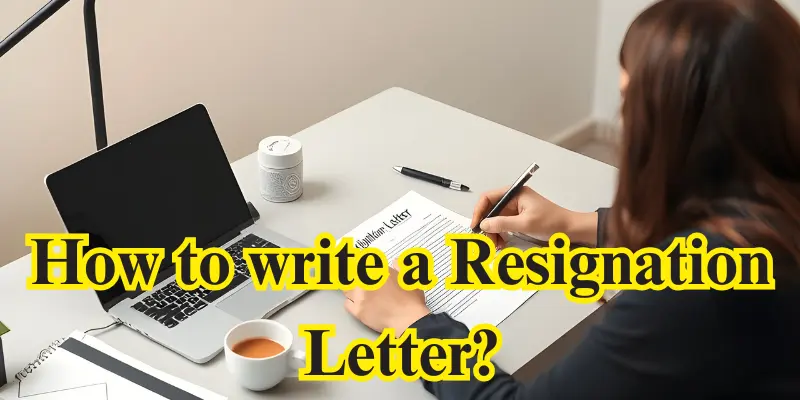
In this “How to” guide, we’ll show you how to write a resignation letter that leaves a positive and lasting impression while keeping things simple and professional.
Ready to create the perfect resignation letter? Let’s dive in!
1. Steps to Take Before Writing a Resignation Letter
Taking the first step to resign from a job is a big decision, and it’s essential to prepare yourself before writing a resignation letter. In this section, we’ll guide you through the key considerations.
Evaluate Your Decision
- Are You Sure About Resigning?
Reflect on your reasons for leaving. Are they compelling enough? Take some time to ensure this is the right move for your career and personal life. - Think About Your Next Steps
Have a plan in place. Whether it’s a new job, further studies, or a break, knowing what comes next will help you feel more confident.
Check Company Policies
- Notice Period Requirements
Review your employment contract to find out how much notice you’re required to give. This helps avoid misunderstandings with your employer. - Procedure for Submitting Resignation
Does your company require a printed resignation letter or an email? Knowing the format and steps beforehand can save you time and effort.
Tip:
“Read your employment contract before writing the letter to understand the rules and requirements.”
2. Key Elements of a Professional Resignation Letter
Writing a resignation letter is simple when you know what to include. Follow this step-by-step guide to ensure your letter is clear, professional, and leaves a positive impression.
Heading:
Start with Your Details
Your resignation letter should begin with your name, contact information, and the date. Place this information at the top of the letter for clarity.
Example:
Rajesh Kumar
456 MG Road
Mumbai, Maharashtra, 400001
Email: rajeshkumar@email.com
Phone: +91 98765 43210
Recipient Details:
Address It Correctly
Include the name, designation, and contact details of your manager or HR representative. This ensures the letter reaches the intended recipient.
Example:
Ms. Priya Sharma
Manager, Finance Department
ABC Corporation
Email: priyasharma@abccorp.com
Subject Line (Optional):
Make It Clear
A subject line is helpful if you’re sending the letter via email. It ensures the purpose of your letter is immediately understood.
Example:
“Resignation Letter – Rajesh Kumar”
Salutation:
Address the Recipient Politely
Begin your letter with a respectful and professional greeting.
Example:
Dear Ms. Sharma,
Opening Statement:
Declare Your Intent
Start with a clear and professional statement of your intention to resign.
Example:
“I am writing to formally resign from my position as Senior Analyst at ABC Corporation, effective two weeks from today.”
Reason for Resignation (Optional):
Keep It Brief
If you choose to include a reason, keep it concise and professional.
Example:
“I have decided to explore a new opportunity that aligns with my long-term career goals.”
Gratitude:
End on a Positive Note
Express your gratitude for the opportunities and support you received during your time at the company.
Example:
“I am thankful for the mentorship, support, and opportunities I received during my time at ABC Corporation. They have been invaluable to my growth.”
Notice Period:
Provide Clarity
Clearly state your last working day based on your notice period.
Example:
“My last working day will be [specific date], in compliance with the notice period mentioned in my contract.”
Closing Statement:
Offer Assistance
End the letter with a positive gesture, such as offering help during the transition.
Example:
“I am happy to assist in the transition process and ensure a smooth handover of my responsibilities.”
Signature:
Add Your Final Touch
If the letter is printed, sign it by hand. For email, type your name at the end.
Example:
Sincerely,
Rajesh Kumar
3. Examples of Resignation Letters for Every Situation
When writing a resignation letter, it’s important to tailor it to your situation. Here are three examples of resignation letters for common scenarios that will help you craft one that fits your needs.
1. Short and Simple Resignation Letter
If you’re looking to keep your resignation straightforward and to the point, this example is perfect:
Heading:
Rahul Verma
123 Green Lane
Mumbai, Maharashtra
Email: rahul.verma@email.com
Phone: 9876543210
Date [Insert Date]
Recipient Details:
Mr. Sharma
HR Manager
XYZ Pvt. Ltd.
Subject Line (Optional):
Resignation Letter
Salutation:
Example:
Dear Mr. Sharma,
Opening Statement:
I am writing to formally resign from my position as Sales Associate at XYZ Pvt. Ltd., effective immediately.
Gratitude:
I appreciate the opportunities and support I received during my time at the company.
Closing Statement:
Thank you for everything, and I wish the company continued success.
Signature:
Sincerely,
Rahul Verma
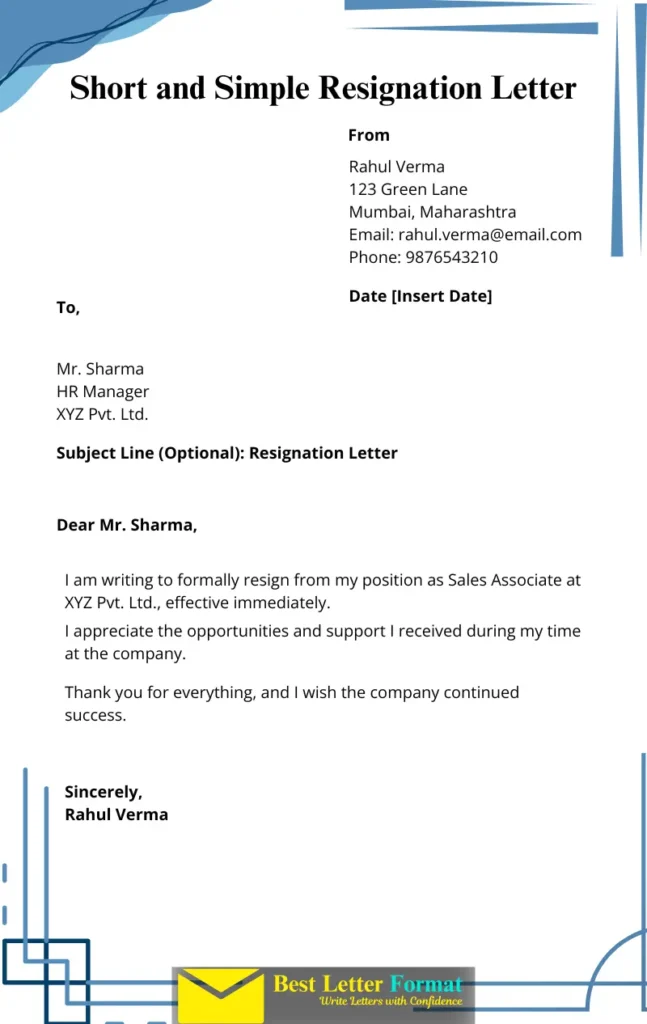
2. Resignation Letter Format for Personal Reasons
When resigning due to personal reasons, keep the tone polite and professional while being concise about your situation.
Heading:
Priya Nair
456 Rosewood Apartments
Bangalore, Karnataka
Email: priya.nair@email.com
Phone: 9123456789
Recipient Details:
Ms. Gupta
Manager, Marketing Department
ABC Solutions
Subject Line (Optional):
Resignation Letter for Personal Reasons
Salutation:
Example:
Dear Mr. Gupta,
Opening Statement:
I regret to inform you that I must resign from my position as Marketing Coordinator at ABC Solutions, effective two weeks from today, [specific date].
Reason for Resignation (Optional):
Due to unforeseen personal circumstances, I am unable to continue in my role.
Gratitude:
I am deeply grateful for the opportunities I have had at ABC Solutions and for your understanding during this time.
Closing Statement:
Please let me know how I can assist with the transition. Thank you for your guidance and support.
Signature:
Warm regards,
Priya Nair
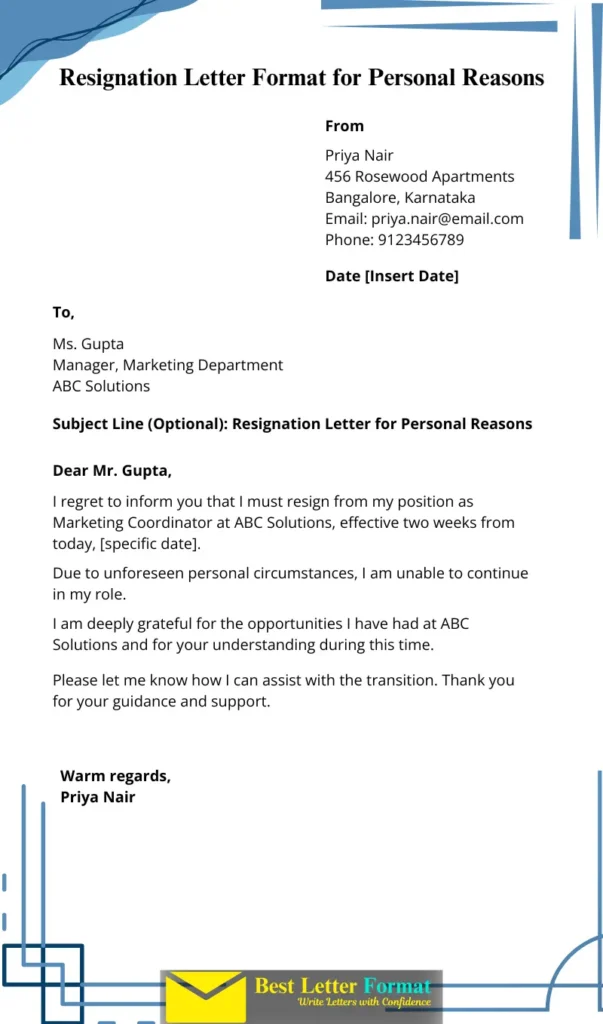
3. Resignation Letter with Notice Period
If you’re required to give notice as per your employment contract, mention it clearly while maintaining professionalism.
Heading:
Ankit Mehta
789 Sunrise Tower
Pune, Maharashtra
Email: ankit.mehta@email.com
Phone: 8765432109
Recipient Details:
Mr. Kumar
Head of Engineering
DEF Technologies
Subject Line (Optional):
Resignation Letter with Notice Period
Salutation:
Example:
Dear Mr. Kumar,
Opening Statement:
I am writing to formally resign from my position as Software Engineer at DEF Technologies, effective two months from today, [specific date], as per the notice period requirement outlined in my employment contract.
Gratitude:
Working at DEF Technologies has been an enriching experience, and I am thankful for the opportunities to grow professionally.
Closing Statement:
I will ensure a smooth handover of my responsibilities and assist in training my replacement if needed.
Signature:
Sincerely,
Ankit Mehta
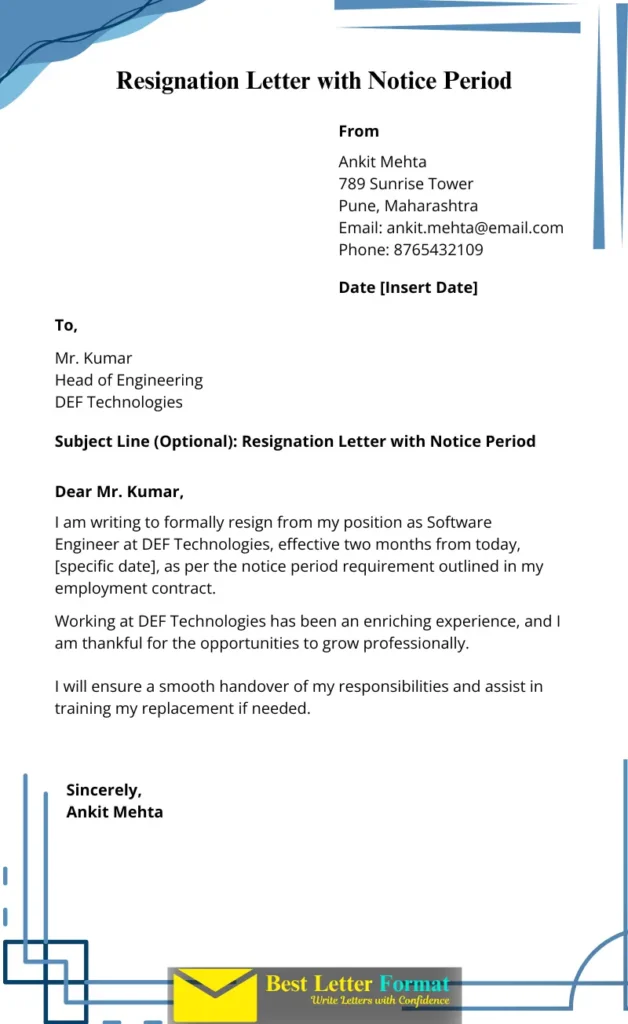
4. Tips for Writing a Resignation Letter
Writing a resignation letter requires a professional tone and clarity to ensure a smooth transition. If you want to understand the basics of what a resignation letter is and why it matters, check out our detailed guide here: What is a Resignation Letter?
This section will focus specifically on actionable tips to make your resignation letter effective and polished. For a deeper understanding of the foundation, visit the linked article.
5. Common Mistakes to Avoid in a Resignation Letter
Writing a resignation letter seems easy, but small mistakes can make it unprofessional. Here are some common errors to avoid.
1. Being Negative
Don’t complain about your job, boss, or colleagues. It can hurt your reputation.
Tip: Write politely and focus on the good experiences you’ve had.
2. Missing Important Details
Forgetting to mention your last working day or notice period can confuse your employer.
Tip: Always include the date of your last day at work.
3. Sharing Too Much
Adding unnecessary personal details makes the letter too long.
Tip: Keep it short and write only what’s needed.
4. Skipping a Thank You
Not saying thank you can look rude.
Tip: Always thank your boss for the opportunities and support.
5. Using Casual Language
Writing informally can make your letter look unprofessional.
Tip: Use a polite and formal tone, even if you’re friendly with your boss.
6. Not Checking for Errors
Spelling or grammar mistakes make the letter look careless.
Tip: Read your letter twice or ask someone to check it.
7. Not Offering Help
If you don’t offer help with the handover, it may seem you don’t care.
Tip: Say you’re ready to help with a smooth transition.
6. Frequently Asked Questions About Writing a Resignation Letter
If you’re unsure about how to write a resignation letter or have specific questions, you’re not alone. Below are some frequently asked questions that will guide you through the process of writing a professional resignation letter.
The standard notice period is usually 2 weeks, but it may vary depending on your employment contract or company policy. Always review your contract to confirm the exact period.
Yes, resigning by email is widely accepted, especially for office jobs. Just make sure your email is professional and follows the formal structure of a resignation letter.
It’s generally unnecessary to mention your future plans in your resignation letter. The focus should remain on your resignation and appreciation for your current job.
A simple resignation letter should clearly state your intention to resign, your last working day, and a brief thank-you note. Keep it concise and to the point.
To resign politely, maintain a respectful and professional tone. Express gratitude for the opportunity and offer assistance in the transition process.
An honest resignation letter should briefly explain your reason for leaving (if you wish) but focus more on gratitude and professionalism. Keep it short and to the point.
A graceful resignation letter shows respect and appreciation for your time with the company. Keep the tone positive, thank your employer, and offer to assist with the transition.
Avoid being negative, giving too much detail, or forgetting key information like your notice period. Always proofread before sending.
Yes, it’s absolutely fine. You can choose not to include a reason for your resignation if you prefer. Keep it professional and brief.
Common sign-offs for resignation letters include “Sincerely,” “Best regards,” or “Yours faithfully,” depending on the tone of your letter.
Wrap-Up
In this article, we’ve covered everything you need to know about how to write a resignation letter. From understanding the key elements to avoiding common mistakes, you now have a clear roadmap to write a professional and respectful resignation letter.
I recommend following these steps when you need to resign, as they’ll help you leave on good terms and ensure a smooth transition.
Ready to get started on how to write a resignation letter? Use the tips in this guide to craft a clear, positive, and professional letter. If you have any questions or want to share your experience, feel free to leave a comment below – I’d love to hear from you!
Now that you know how to write a resignation letter, it’s time to take action. Follow the tips above, and make your resignation process smooth and professional. Need more help? Check out our complete resignation letter guide for further details!

- Be Respectful
- Stay Relevant
- Stay Positive
- True Feedback
- Encourage Discussion
- Avoid Spamming
- No Fake News
- Don't Copy-Paste
- No Personal Attacks

- Be Respectful
- Stay Relevant
- Stay Positive
- True Feedback
- Encourage Discussion
- Avoid Spamming
- No Fake News
- Don't Copy-Paste
- No Personal Attacks



